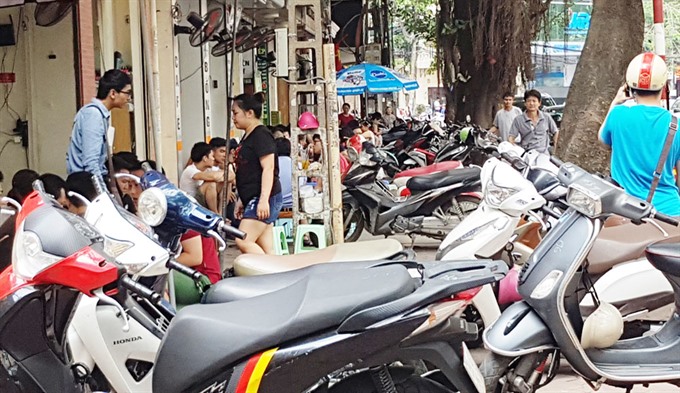 Society
Society

Many pavements in Hà Nội were cleared of encroachments in the two months after a campaign was launched to remove illegally parked cars, vendors, cafes, canopies and other obstructions, but the problem has recently resurfaced.
 |
| Ward police has issued regular warning to violators, but the minute police left, shop owners brought out chairs and other equipment obstructing the sidewalk in Thái Phiên Street, Hai Bà Trưng District.— Photo kinhtedothi.vn |
HÀ NỘI — Many pavements in Hà Nội were cleared of encroachments in the two months after a campaign was launched to remove illegally parked cars, vendors, cafes, canopies and other obstructions, but the problem has recently resurfaced.
An observation by a Kinh Tế Đô Thị (Economy and Urban Affairs) newspaper correspondent showed that on various streets of different districts, including Tây Hồ, Ba Đình, Hai Bà Trưng and Cầu Giấy, pavement encroachment had been rife at weekends.
Most violations were reported in the areas of the Hôm and Trời markets, and streets with restaurants and coffee shops.
Ngô Thị Lan, a resident of Thái Phiên Street in Hai Bà Trưng District, said that ward police issued regular warning to violators, but the minute police left, shop owners brought out chairs and other equipment obstructing the sidewalk.
The same thing happened in Văn Chương Alley in Đống Đa District. During two weekend days, traders of a temporary market displayed their goods on the pavements, on the road and even in front of the office of the Văn Chương Ward People’s Committee.
Vũ Tiến Hưng, chairman of the Văn Chương Ward People’s Committee, said that the committee and ward police assigned officers to patrol and give warnings to small traders, but due to a shortage of police officers, the violators resumed their unlawful activities. The ward would strive to allocate more inspectors, he said.
Nguyễn Thu Ánh, deputy head of the Hai Bà Trưng District Urban Management Division, said most of the violators were hard-working, poor small traders.
To maintain urban order sustainably, she said, a communication network should be set up to spread information to residents about the campaign to remove illegally parked cars, shops, extended canopies and other obstructions.
Đào Ngọc Nghiêm, deputy chairman of the Hà Nội Urban Planning and Development Association, attributed the problem to lax supervision of the campaign. Local authorities’ role in giving administrative fines to violators was also not being implemented well, he said.
And lastly, he said, authorities did not resolve an important problem of ensuring the livelihood of low-income residents, so the violations will keep recurring.
Phạm Sỹ Liêm, deputy chairman of the Việt Nam Construction Federation, said that during the campaign, pavements in the capital were clear, but they were re-encroached after the campaign because inspectors slakened discipline. To maintain urban order, a task force with supervisors, punishments and funds were needed, he said.
Authorities should adopt international management principles known as the 3Is - information, incentive and interdiction, he said. The campaign did not: it banned parking and vendors, but did not create conditions for residents to continue their trading. Authorities should allocate space so that residents can trade legally. “Doing it, authorities will receive residents’ agreement,” said Liêm. – VNS




